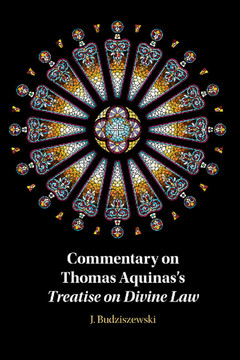Commentary on Thomas Aquinas's Treatise on Divine Law
Langue : Anglais
Auteur : Budziszewski J.

This close reading of Thomas Aquinas explores the relevance of the Divine Law to the modern world.
Thomas Aquinas's classic Treatise on Divine Law is brought to life in this illuminating line-by-line commentary, which acts as a sequel to Budziszewski's Commentary on Thomas Aquinas's Treatise on Law. In this new work, Budziszewski reinvestigates the theory of divine law in Aquinas's Summa Theologiae, exploring questions concerning faith and reason, natural law and revelation, the organization of human society, and the ultimate destiny of human life. This interdisciplinary text includes thorough explanations, applications to life, and ancillary discussions that open up Aquinas's dense body of work, which tends to demand a great deal from readers. More than a half-century has passed since the last commentary on Thomas Aquinas's view of these matters. Budziszewski fills this gap with his consideration of not only the medieval text under examination, but also its immediate relevance to contemporary thought and issues of the modern world.
Personal preface: on discovering Thomas Aquinas; Commentator's introduction; 1. Was a divine law needed?; 2. Does divine law come in one edition, or in two, old and new?; 3. Were any of the old law's precepts moral?; 4. Were any of the old law's precepts judicial?; 5. Were the promises of benefits and threats of penalties appropriate?; 6. Are all of the old law's moral precepts also included in the natural law?; 7. Why does the old law contain just these moral precepts?; 8. Were the old law's moral precepts appropriately formulated?; 9. Can any exceptions be made to the old law's moral precepts?; 10. Was it enough to obey the old law's moral precepts, or did they have to be obeyed in a certain way?; 11. Did the old law's moral precepts have to be obeyed according to love or charity?; 12. How are the moral precepts of the decalogue related to the old law's other moral precepts?; 13. Did the moral precepts of the old law make man just and acceptable in the sight of god?; 14. Were the old law's ceremonial precepts arbitrary, or given for intelligible reasons?; 15. Reasons for old law judicial precepts about relations between citizens and rulers; 16. Reasons for old law judicial precepts about relations among citizens; 17. Reasons for old law judicial precepts about relations with non-citizens; 18. Is the new law a written law, or is it poured into us?; 19. Does the new law make men just and acceptable in the sight of god?; 20. Is it appropriate that the new law includes not only precepts but also 'counsels'?; 21. Afterword: Implications of St Thomas's teaching for the world of the present.
J. Budziszewski is Professor in the Departments of Government and Philosophy, University of Texas at Austin. Especially known for books on classical natural law and commentaries on Thomas Aquinas, he is also keenly interested in virtue ethics, conscience, self-deception, family and sexuality, religion in public life, toleration, and the unravelling of our common culture.
Date de parution : 04-2021
Ouvrage de 500 p.
23x15 cm
Disponible chez l'éditeur (délai d'approvisionnement : 14 jours).
Prix indicatif 102,80 €
Ajouter au panierThème de Commentary on Thomas Aquinas's Treatise on Divine Law :
© 2024 LAVOISIER S.A.S.



